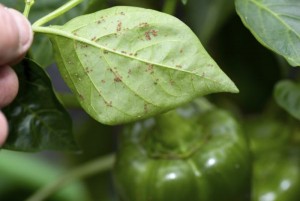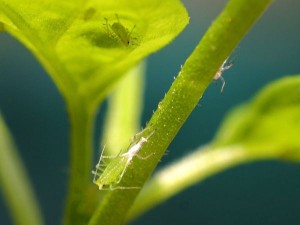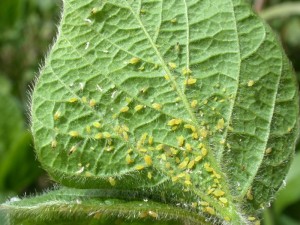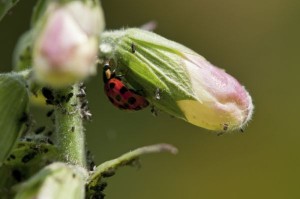It’s that time of year again: some plants are thriving in the garden, some are creeping along and we pray they’ll pull through, and a few just appear to be weak, bug-eaten, stressed, and damaged beyond repair. To help minimize the latter from happening in your garden this summer, today we’re talking about the little demons that are a major thorn in any gardener’s side, aphids. They may be small, but as most gardeners know they pack a serious punch, so today’s post explores some methods of organic pest control for aphids to help prevent infestation.
Who is the Aphid?
There are thousands of species of aphids out there – and while only a few hundred of them are known to cause damage to crops, that’s surely enough! They come in almost every color of the rainbow, but I mostly see the black and green ones at the Bounty.
Fun/Gross Fact: one year can see multiple generations of aphid births, and within just a week, and adult aphid can produce up to 80 offspring. Holy Moly!
How Aphids Damage Your Garden
Aphids love fresh, tender new growth because that’s where they can most easily pierce through cell walls and suck gooey nutrient-rich sap out of your plants. They also particularly love the undersides of leaves. It’s important to check your leaves frequently, as once they have started to curl due to aphid infestation, it’s harder to control them.

Their damage continues beyond this initial robbery, however. They also secrete ‘honeydew’ which creates a great environment for mold to grow, and they carry and spread a whole range of diseases from plant to plant.
Organic Pest Control for Aphids
There are many tried-and-true methods for getting rid of aphids, or at least for holding them off for a while. There are even more old wives tales, urban legends, and straight up myths about crafty ways to banish aphids from your garden forever. Let’s skip the mythology and crazy tales, and dive straight into some of my favorite, proven organic methods of pest control for aphids.
First of all, the most important preventative approach for aphid deterrence is, once again, working on your soil health. We talk about soil health in practically every blog post because it’s just that important! Get your soil tested, amend as needed, add compost, grow cover crops, and get down in the dirt to notice what’s going on. Healthy plants will not draw as much attention from aphids and when they do, they’ll be stronger and more able to combat an infestation.
Cultural Control
Your first step in getting rid of any problem in the garden is always going to entail thinking about how to proactively prevent this problem. Aphids are drawn to many plants that are probably present in your larger landscape – such as mustards. Clean your garden and surrounding areas of any unnecessary plants, and make sure you are only putting healthy aphid-free transplants into the ground.
Cut Them Out
If you find aphids on just one plant or one section of a few plants, it’s worth getting in there to prune them out. Simply cut out the whole part of the plant that is infested.
Grab Your Hose
For real. Set your nozzle on a heavy spray setting, and spray the aphids off your plants. Of course you want to be careful to not damage young, tender plants, so don’t go too crazy. But most aphids that you spray off won’t return.
Use Neem Oil as an Organic Pest Control for Aphids
In my humble opinion, neem oil is god’s gift to the organic gardener. A vegetable oil derived from the neem tree (native to India among other places), it’s a safe, easy-to-find and affordable spray that helps to smother not only aphids, but cabbage worms, ants, leafminers, and beetles as well. Most people use the oil diluted to just 2% in water, and spray repeatedly on an ongoing basis. It may well also deter some beneficial insects, do don’t spray with abandon.
Or Use Soap
Household soap, diluted to just 2 tablespoons per gallon, can also be sprayed on plants to suffocate aphids. Many people recommend spraying the soap residue off after a couple of hours so as to not burn the plants.
Potent Oils Work Too
Many gardeners rely on solutions made of strong-smelling oils such as garlic, clove, rosemary, peppermint, and thyme. They are thought to deter and kill aphids when mixed into a spray bottle with water.
Introduce Predatory Insects
There are many known insects that feed on aphids. Ladybugs are a common one – either naturally occurring in your garden, or ones you buy in (they can store in the fridge) and release outside. Parasitic wasps are great natural predators, as well as soldier beetles and lady beetles.
So in conclusion, now is a great time to get out there, check for aphids, and get some control over them. On my farm their presence is inevitable – so each fall I have to decide how heavily I’m going to invest my time and energy into these solutions. Looking back over the season, it’s always worth it to stay on top of it before it becomes a problem.










 Family
Family

